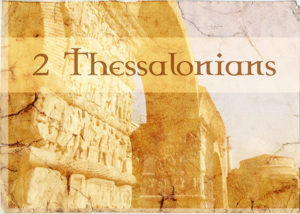Are God, Jesus, and the holy Spirit a Trinity in 2 Thessalonians?
In the Bible book of 2 Thessalonians, the Apostle Paul speaks of God, Jesus Christ, and the holy Spirit. If Paul and/or the early Christians believed Jesus is God or part of a Trinity, we should be able to find evidence of this in the New Testament letters. But is this the case in 2 Thessalonians? Is the Trinity in 2 Thessalonians? Let’s examine some of the pertinent verses to find out.

“To the church of the Thessalonians in God our Father and the Lord Jesus Christ.” (2 Thessalonians 1:1). In this very first verse, God is distinguished here from Jesus and there is no mention of the holy Spirit.
“Grace and peace to you from God the Father and the Lord Jesus Christ.” (2 Thessalonians 1:2). The same clear distinction is made between Jesus and God in the greetings in the second verse. Notice the conspicuous absence of any greetings from the holy Spirit! If the holy Spirit is the third person of the Trinity, and if the Trinity is a true doctrine, why is the Spirit not mentioned here?
“He will punish those who do not know God and do not obey the gospel of our Lord Jesus.” (2 Thessalonians 1:8). Two separate, distinct individuals are spoken of here – God, and also Jesus, who is called “Lord,” not God.
“We pray this so that the name of our Lord Jesus may be glorified in you, and you in him, according to the grace of our God and the Lord Jesus Christ.” (2 Thessalonians 1:12). Again, God and Jesus are spoken of above as separate and distinct. Notice how Jesus is not called “God,” but “Lord.” The phrase “Our God” is differentiated from “the Lord Jesus Christ.”
“They perish because they refused to love the truth and so be saved . . . all will be condemned who have not believed the truth”—2 Thessalonians 2:10,12. Salvation depends on knowing, believing, and loving “the truth” about the “Father . . . the only true God, and Jesus Christ whom [he] . . . sent“ (John 17:3).
“We ought always to thank God for you, brothers and sisters loved by the Lord, because God chose you as first fruits to be saved through the sanctifying work of the Spirit and through belief in the truth”—2 Thessalonians 2:13. Trinitarians claim this verse as a “proof” text of their doctrine. If “Lord” in this verse is Jesus, then the three are named. But does that make them a Trinity? Not one aspect of the doctrine is mentioned – No Almightiness, no equality, no eternity, no three-in-one “Godhead,” etc. In this verse, God uses his holy Spirit to save Christians. The holy Spirit is referred to as “the,” so it is obvious that the Spirit is not a person, and therefore, cannot be, God.
“He [God] called you to this through our gospel, that you might share in the glory of our Lord Jesus Christ.” (2 Thessalonians 2:14). This verse shows that God is in control, and he uses Jesus in a mighty way.
“May our Lord Jesus Christ himself, and God our Father who has given us his love, and through his grace, such ceaseless encouragement and such sure hope”—2 Thessalonians 2:16 NJB. God and Jesus are clearly shown to be two separate and distinct individuals, and there is no mention of the holy Spirit, which is a clue that it is not a person.
“May the Lord direct your hearts into God’s love and Christ’s perseverance.” (2 Thessalonians 3:5). God and Christ are distinguished yet again in this verse, as two entirely separate and distinct individuals.
So as we can see from the book of 2 Thessalonians, Paul describes the Father as God, and Jesus Christ as Lord. He differentiates God from Jesus. And he never calls Jesus “God.” The holy Spirit is not presented as being a person, The evidence proves there is no Trinity in 2 Thessalonians.
For more information about this topic, see our series of articles: “Are God, Jesus, and the holy Spirit a Trinity?”
All Bible verses quoted from New International Version (NIV), except where otherwise noted